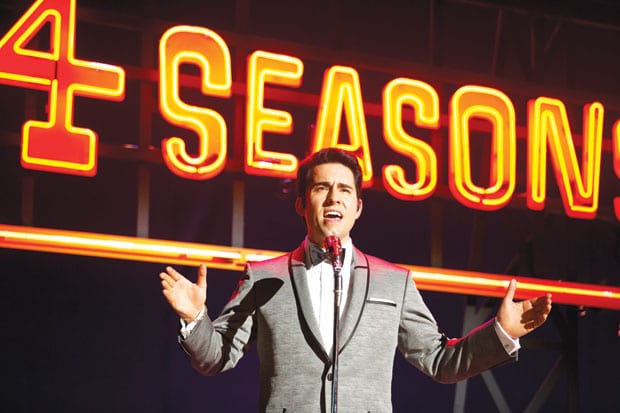Movies go B’way with ‘The Nance’ and ‘Jersey Boys’ — with mixed results
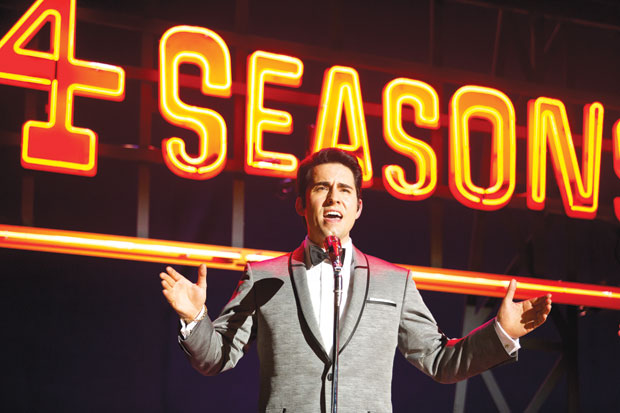
WALK LIKE A MAN | John Lloyd Young is charismatic as Frankie Valli, the role he created onstage, but Clint Eastwood’s lumbering direction derails the film adaptation of ‘Jersey Boys.’
ARNOLD WAYNE JONES | Executive Editor
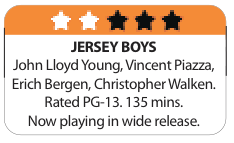 The structure of Jersey Boys — the hit Broadway musical about the career of Frankie Valli and the Four Seasons, now adapted for the screen — resembles, oddly enough, the Harry Potter series. Like Harry, Frankie (played by its stage star, John Lloyd Young) is someone identified as having special, inimitable gifts, and who must be protected at all costs. All his friends want him — need him — to succeed, so they form a phalanx around him, taking the rap for his crimes, overlooking his slip-ups. In that way, Jersey Boys is really a story about loyalty and its inevitable limits.
The structure of Jersey Boys — the hit Broadway musical about the career of Frankie Valli and the Four Seasons, now adapted for the screen — resembles, oddly enough, the Harry Potter series. Like Harry, Frankie (played by its stage star, John Lloyd Young) is someone identified as having special, inimitable gifts, and who must be protected at all costs. All his friends want him — need him — to succeed, so they form a phalanx around him, taking the rap for his crimes, overlooking his slip-ups. In that way, Jersey Boys is really a story about loyalty and its inevitable limits.
The first person to recognize genius in Frankie was a neighborhood goombah named Tommy DeVito (Vincent Piazza), a mobbed-up wannabe who would steal a cigarette lighter from his own record producer just because it would never occur to him to be honest for more than five minutes. But the relationship that warms our hearts is the one between Frankie and Bob Gaudio (Erich Bergen), the fourth member of the Four Seasons and the composer of virtually all the group’s hits. Early in their careers, Bob and Frankie had a handshake deal to share in each others financial successes, and that deal’s enduring nature — one of the last lines of the play — is a testament to what it really means to be from New Jersey.
Only that scene isn’t even in Clint Eastwood’s film of Jersey Boys, a gross oversight but hardly the only one in this disappointing stab at bringing a musical from stage to screen.
In recent years, Eastwood has become better known for lecturing to an empty chair at the 2012 Republican national convention than for his movies, and watching that fiasco was more entertaining than most of the musical numbers he stages here.
It should have been obvious from the start. Eastwood, like Woody Allen, is a jazz connoisseur whose pop music tastes ended when Glenn Miller died. He’s temperamentally ill-suited to turn a show known for its doo-wop energy into an engaging song-and-dance show. The goal seems to be making The Godfather with singing rather than a musical with some weight to it.
Musicals have to be just that — musical, full of singing and dancing. But Clint’s history with the form isn’t exactly toe-tapping. He costarred in 1969’s Paint Your Wagon, by consensus one of the worst movie musicals of all time. In the 1980s, he directed Bird, a biopic about jazz musician Charlie Parker. This film more closely resembles Bird than it does the stage version of Jersey Boys — a dour drama set in a minor key than only incidentally seems interested in the music of the Four Seasons. If you go in expecting to be delighted by two hours of nostalgic pop songs from the 1960s and ’70s, you’ll leave as frustrated as I did. Valli and company turned out about 10 catchy singles in their heyday; four are barely performed at all here, crammed into the closing five minutes of the film.
Eastwood also tinkers with the structure of the storytelling, which uses each Four Season as a narrator for one “season” of the band’s life. But Valli never becomes our narrator, and the point seems lost on Eastwood altogether.
The saving graces are the performances, especially by Young (enchanting as the naifish Frankie, potent as an adult), Piazza (astonishingly convincing as the self-destructive Tommy) and Mike Doyle as Bob Crewe, the gay record producer who guided the group through its career. They convey, in precise ways, a history of America as seen from the ground up, with their eyes on the stars. Casey Kasem would have been proud.
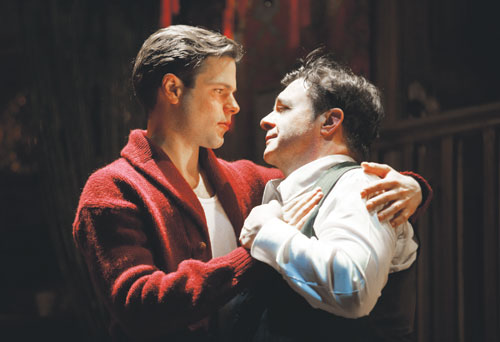
BURLESQUE ACT | A hobo (Jonny Orsini) begins a romantic attachment to a music hall entertainer (Nathan Lane) in the Tony Award-winning play ‘The Nance,’ which will be broadcast to movie theaters across North Texas this week. (Photo by Joan Marcus)
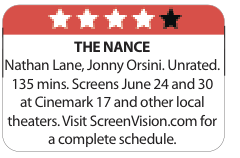 Bob Crewe could be more-or-less out in the New York record business of the 1960s; the same wasn’t true of Chauncey Miles, a burlesque star of the 1930s known for playing “the nance,” a stock character who minced flamboyantly for laughs between scenes of girls taking their clothes off. 1937 was a dangerous time to be gay, when even the whiff of scandal could derail any career, and cops raided gathering places for sport, just to mess with the queers. But somehow homosexuality survived.
Bob Crewe could be more-or-less out in the New York record business of the 1960s; the same wasn’t true of Chauncey Miles, a burlesque star of the 1930s known for playing “the nance,” a stock character who minced flamboyantly for laughs between scenes of girls taking their clothes off. 1937 was a dangerous time to be gay, when even the whiff of scandal could derail any career, and cops raided gathering places for sport, just to mess with the queers. But somehow homosexuality survived.
The Nance, Douglas Carter Beane’s Tony Award-winning Broadway hit of last season — like Brokeback Mountain — is about both the sad cost of being closeted in an intolerant world and the profoundness of needing to connect with another person, despite that cost.
If you didn’t catch The Nance it during its Lincoln Center run last year, you can remedy that this week, as the filmed version of the play screens at local theaters.
Despite a degree of fame in the footlights, Chauncey (Nathan Lane) lives much of his life in the shadows. He trolls the local automat to pick up down-on-their-luck victims of the Great Depression who, for a slice of pie and a ham sandwich, will spend the night with Chauncey before he sends them off in the morning.
But this time, one piece of trade (Jonny Orsini) doesn’t want to go. He’s not some gay-for-pay hobo, but a genuinely confused rube exploring his sexuality in the big city.
In scenes that shift fluidly between Chauncey’s home life and his outrageous stage act, we get a taste for the comedic guts it took to spoof a character who he was in real life: to turn into a buffoon the reality of his own existence … and the paradox that he’s a blindly loyal lifelong Republican. (“A pansy who’s a Republican?”one character observes, “that’s like a Negro Klan member.”) When the era’s moral police force him into the closet, even stop him from mincing amusingly onstage, he’s faced with a conundrum about how much he can compromise.
Lane is perfect at these kinds of roles, with his exaggerated personality and unexpected underplaying. He’s heartbreaking and hilarious by turn.
But it’s Beane’s gift with words — his ability to land a one-liner while imbuing a campy intellectualism into it — that sets the script apart. “For future references, there are only three things that I am ever talking about, dear heart,” Miles says, his voice dripping in syrupy wit. “There were four, but then they’ve gone and cast Barbara Stanwyck as Stella Dallas.” Those kinds of lines are awash in pop culture references — not just contemporary, but historic.
It would be nice if The Nance could one day be opened up and turned into a full-on movie, but I have a suspicion it would lose a lot in the process. This is theatricality at its most wizardly, a story as born to the stage as a vaudevillian. Still, that’s no reason not to catch it on the big screen — it’s the next best thing.
This article appeared in the Dallas Voice print edition June 20, 2014.

